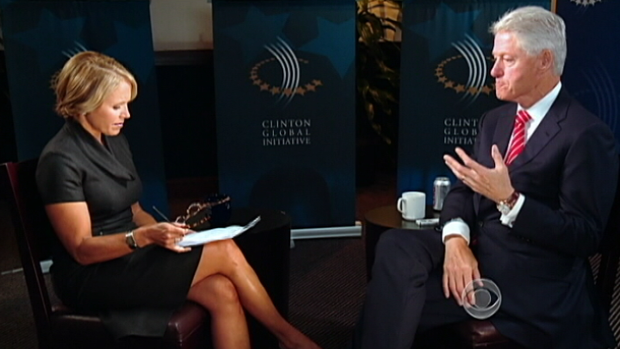Bill Clinton: Colin Powell Don't Ask, Don't Tell Policy Fell Short
Updated: Sept. 22, 2010 5:58 PM ET
Former President Bill Clinton said that the vision offered by Colin Powell, the Chairman of the Joint Chiefs of Staff during the first year of his presidency, for how Don't Ask, Don't Tell would work didn't pan out.
In an interview Tuesday, Clinton told CBS Evening News anchor Katie Couric that he didn't choose the Don't Ask, Don't policy, which bans gays from serving openly in the military. "I accepted it because it was better than an absolute ban," Clinton said. "I was promised it would be better than it was."
"Don't ask, don't tell was only adopted when both Houses of Congress had voted by a huge veto-proof margin to legislate the absolute ban on gays in the military if I didn't do something else," Clinton said. "So there's been a lot of rewriting history saying Bill Clinton just gave into that. That's just factually false. I didn't do anything until the votes were counted. Now, when Colin Powell sold me on don't pass, don't tell, here's what he said it would be. Gay service members would never get in trouble for going to gay bars, marching in gay rights parades as long as they weren't in uniform That was what they were promised. That's a very different don't ask, don't tell than we got."
"...it's some big myth that somehow it rolled for the military to Congress voted," Clinton continued. "And I got beat. And so did the gay rights people got beat. So, there's been a lot of rewriting history, saying, oh, Bill Clinton just gave into that. That's just factually false. I didn't do anything until the votes were counted. Now, when Colin Powell sold me on don't ask, don't tell, here's what he said it would be. Gay service members would never get in trouble for going to gay bars, marching in gay rights parades as long as they weren't in uniform, getting gay materials, for any of the places they went or any of the things they did as long as they didn't talk about it."
"That was what they were promised. That's a very different don't ask, don't tell than we got," Clinton said. "What we got as soon as General Powell retired was this vicious mid- and low-level officer feedback where they--for a year or so--made it worse than it had been before. Then, they sort of settled down. But the reason I accepted it was because I thought it was better than an absolute ban. And because I was promised it would be better than it was.
The Don't Ask, Don't Tell directive was passed into law in December 1993. Powell retired from the military in October 1993.
Watch the video of former President Clinton on Don't Ask, Don't Tell
Powell is now in favor of repealing the law. In February 2010, Powell said, "In the almost 17 years since the 'don't ask, don't tell' legislation was passed, attitudes and circumstances have changed....I fully support the new approach presented to the Senate Armed Services Committee this week by Secretary of Defense Gates and Admiral Mullen."
Gates and Mullen, the current chairman of the Joint Chiefs of Staff, offered their support to President Obama for repealing Don't Ask, Don't Tell.
While Clinton was talking to Couric, Senate Republicans blocked an effort to repeal Don't Ask, Don't Tell, continuing the ban on gays serving openly in the military.
More From Katie Couric's Interview:
Clinton: Tea Party Recipe is WrongFormer President On 2010 Midterms
Ed. Note: This story was updated to reflect that General Powell had retired from the military before the Don't Ask, Don't Tell directive was implemented.
